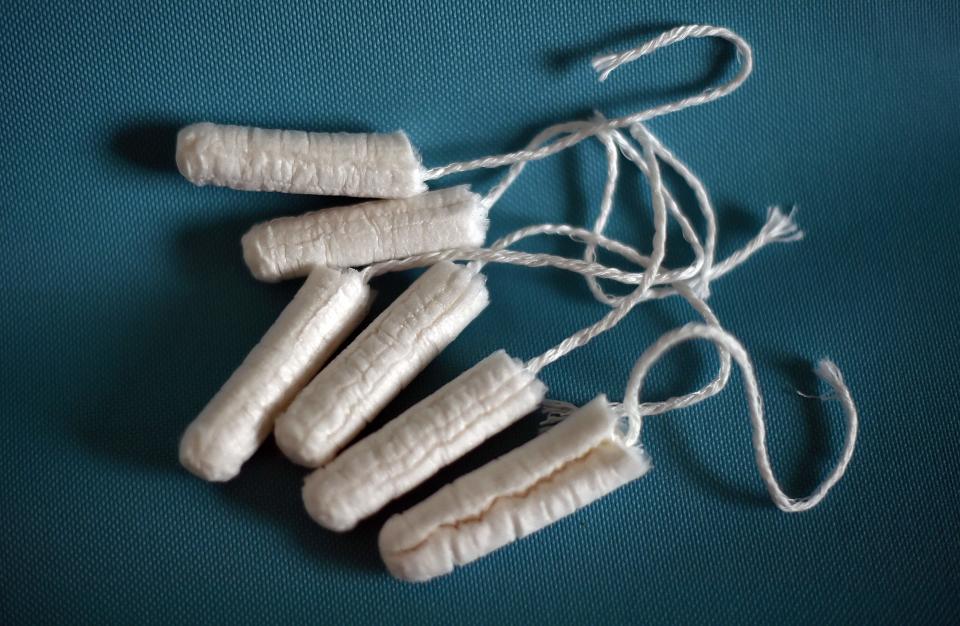Fact check: False claim that tampons cause endometriosis
The claim: Tampons cause endometriosis by blocking menstrual fluid
A March 4 Instagram video (direct link, archived link) purports to inform people about dangers associated with using tampons.
“You got to stop using a tampon, I’m serious,” says a man in the video. “Ladies, you’re potentially pushing your flow back up, and those endometrium cells can get misplaced in your belly cavity. If this happens you can end up in tremendous pain with a condition called endometriosis.”
The video was liked more than 1,000 times within a week.
Follow us on Facebook! Like our page to get updates throughout the day on our latest debunks
Our rating: False
There is no evidence using tampons causes endometriosis, multiple gynecology experts told USA TODAY. Tampons do not block menstrual blood, they absorb it. Tampon usage has even been associated with a decreased risk of endometriosis.
No data suggesting tampons cause endometriosis, experts say
Endometriosis is a disorder that occurs when tissue similar to the tissue that grows inside the uterus grows outside the uterus, the Mayo Clinic explains. It can cause pain and fertility problems.
It's not caused by tampons.
“There is no evidence that tampon usage is associated with increased risk of endometriosis,” said Candace Tingen, a program officer at the National Institutes of Health’s Gynecologic Health and Disease Branch.
Fact check: ICD-10 medical codes are used to track trends, not individuals
Tingen cited two past studies examining possible associations between tampon usage and endometriosis. One found no link, and the other found that women who used tampons were less likely to have endometriosis.
Another theory linked dioxins, which people presumed to exist in high levels in tampons, to endometriosis. But Tingen said this is false, as research has shown tampons contain safe and nondetectable amounts of dioxins.
The idea that tampons block menstrual fluid is wrong, too, Tingen said.
“They absorb it, and they certainly do not force it back up into the cervical canal, back into the uterus, and all the way up the fallopian tubes,” Tingen said. “They are absorbent materials, not power washers!”

The fact that menstrual fluid leaks around the tampon once it is saturated is further proof that the products do not block the flow, said Dr. Nash Moawad, chief of the Division of Minimally Invasive Gynecologic Surgery at the University of Florida Health.
"If tampons functioned by blocking the menstrual flow, one tampon would suffice for the entire menstrual cycle and there would be no need to change a tampon," Moawad said.
The man in the video may have been thinking of retrograde menstruation, which refers to when menstrual fluid flows upwards back through the fallopian tubes and out into the abdomen, Tingen said.
But there is no way for tampons to affect this process, and most women experience it naturally, she said. Although retrograde menstruation is one idea for how endometriosis begins, it alone is not sufficient to cause endometriosis.
The Instagram user who shared the claim did not provide any evidence to support it.
The Associated Press also debunked the claim.
Our fact-check sources:
Candace Tingen, March 10, Email interview with USA TODAY
Erin Carey, March 10, Email interview with USA TODAY
Nash Moawad, March 12, Email interview with USA TODAY
Sanjay Agarwal, March 10, Email interview with USA TODAY
Mayo Clinic, accessed March 10, Endometriosis
PubMed, June 15, 2006, Environmental and host-associated risk factors in endometriosis and deep endometriotic nodules: a matched case-control study
PubMed, 2002, Sexual activity, orgasm and tampon use are associated with a decreased risk for endometriosis
PubMed, May 14, 2005, Dioxin and furan levels found in tampons
The Associated Press, March 7, Tampons don’t cause endometriosis
Thank you for supporting our journalism. You can subscribe to our print edition, ad-free app or electronic newspaper replica here.
Our fact-check work is supported in part by a grant from Facebook.
This article originally appeared on USA TODAY: Fact check: No evidence tampons cause endometriosis

